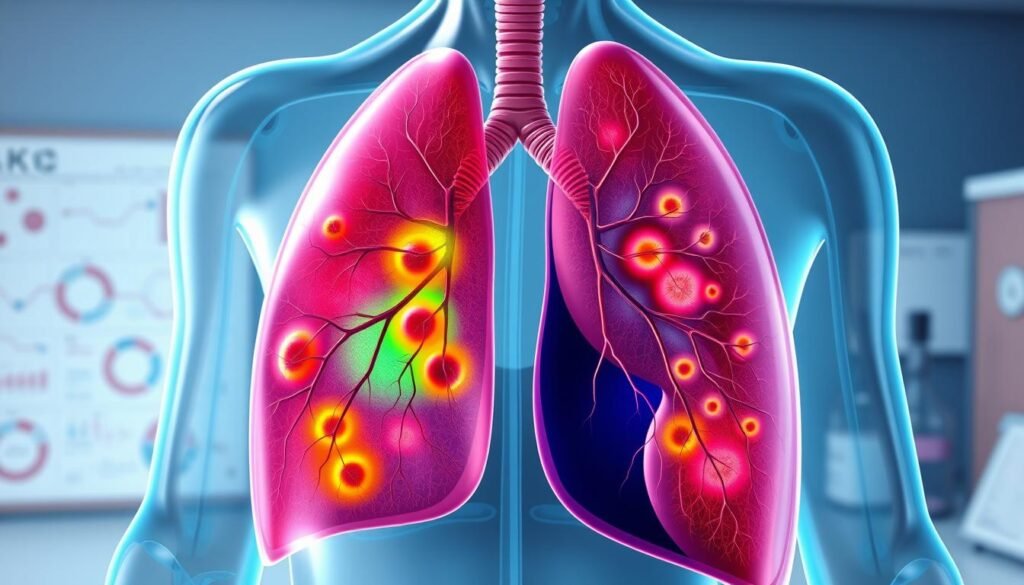About half of the people with colorectal cancer will face metastatic disease. The lungs are often where this cancer spreads. Roughly 10-15% of patients will see their cancer move to their lungs. Knowing this is crucial, as it impacts the outlook, treatment choices, and survival possibilities for those affected. Lung metastases can seriously change a person’s chances, highlighting the importance of catching it early and finding the right treatment approach.
Key Takeaways
- Lung metastases are observed in 10-15% of colorectal cancer patients.
- Up to 50% of colorectal cancer patients develop metastatic disease.
- The lungs are a common site for cancer spread, particularly after colorectal cancer treatment.
- Surgical options may significantly enhance survival outcomes for selected patients.
- Early intervention is vital for improving overall survival rates in cases of lung metastases.
Understanding Colorectal Cancer Staging
Colorectal cancer staging is key in figuring out the outlook and treatment for patients. This process places the cancer into stages based on its growth and spread. Stage 0 means the cancer is just in one area, while stage IV means it has spread far, like to the lungs.
The AJCC TNM system is mainly used here. It looks at how big the tumor is, if it has reached lymph nodes, and if there is metastasis. Knowing this helps understand how the cancer has spread. Each stage gives a sense of how much the tumor has grown:
- Stage 0: Cancer is only in the inner layer of the colon or rectum.
- Stage I: The tumor has gone into deeper layers but hasn’t hit lymph nodes or distant parts.
- Stage II: This is split into IIA, IIB, and IIC, depending on the tumor’s depth.
- Stage III: Cancer has reached nearby lymph nodes.
- Stage IV: Cancer has moved to distant parts of the body, with the impact varying by the number of organs affected.
Understanding colorectal cancer stages helps doctors make good treatment plans. Early stage cancers usually have better outcomes, with a five-year survival rate of 90.9 percent. But, those with cancer that has spread far have a much lower survival rate of about 15.6 percent. It shows how crucial early detection and action are.
Signs and Symptoms of Lung Metastases
Lung metastases are a major concern for people with various primary cancers, like colorectal cancer. Often, the symptoms of lung metastases don’t show until the disease is advanced. This makes early detection and treatment difficult.
When metastatic lung lesions develop, patients might start to notice different symptoms. This leads them to seek medical help. Common signs are:
- Persistent cough
- Shortness of breath
- Chest pain
- Coughing up blood
- Fluid accumulation around the lungs
- Decreased appetite
- Weight loss
Knowing these symptoms of lung metastases can help catch the condition early. Testing might include imaging studies and biopsies. It also involves discussing health history. Sometimes, people with metastatic lung lesions get frequent infections, which pose additional health challenges.
The main cancers that lead to lung metastases are breast, colorectal, kidney, and testicular cancers. Knowing this can help us understand the associated risks and outcomes.
If you’re worried about lung metastases, staying informed is crucial. Visiting reputable cancer information websites offers key details on symptoms and treatment options.
Colorectal Cancer Metastasis to Lung: Key Insights
Lung metastasis in colorectal cancer is a big challenge. It happens when cancer spreads from the colon or rectum to the lungs. This is common, affecting about 10-15% of patients. It shows why it’s important to find and treat lung metastases early.
These lung metastases often have specific genetic traits. For example, 53% have KRAS mutations, with KRAS G12D being the most frequent. Genes like APC and TP53 also play a role in how the tumor behaves and affects patients.
The typical patient is about 60 years old and can be of any gender. Interestingly, a majority, about 73%, have cancer starting in the rectum, not the colon. This difference is crucial for choosing the right treatment.
At diagnosis, most patients are at stage III. This stage is key for deciding on treatment. Some may have surgery to remove lung metastases. Success rates for this surgery vary, giving some patients a 27% to 68% chance of surviving five more years.
Understanding these factors is vital for treating lung metastases from colorectal cancer. Ongoing research aims to find better ways to treat patients. This could make a big difference for those facing this tough condition.
| Factor | Details |
|---|---|
| KRAS Mutation Frequency | 53% in pulmonary metastases and primary tumors |
| Common KRAS Site Variation | KRAS G12D |
| APC Mutation Frequency | 89.5% in pulmonary metastases |
| Age at Diagnosis | Median: 60 years (IQR: 48–67 years) |
| Percentage of Patients with Rectal Cancer | 72.7% |
| Five-Year Survival Rates post-Pulmonary Resection | 27% to 68% |
Common Treatment Options for Lung Metastases
Treating lung metastases from colorectal cancer is key to better patient outcomes and life quality. A personalized plan is critical and may include various tactics to fight this tough disease. Knowing about treatments like chemotherapy, targeted therapy, and surgery is crucial for managing it well.
Chemotherapy
Chemotherapy is a main treatment for lung metastases. It uses drugs to kill cancer cells quickly and shrink tumors. Studies show patients first treated with chemotherapy for lung metastases live about 23.8 months on average. When mixed with other treatments, chemotherapy works even better.
Targeted Therapy
Targeted therapy is a key innovation in treatment. It doesn’t hit all fast-growing cells like chemotherapy but targets cancer cell processes. It stops the paths that let tumors grow. Talking with doctors about targeted therapy is vital as it can boost survival chances.
Lung Surgery
Lung surgery is a hopeful choice for patients with limited lung metastases. The procedure might be a wedge resection or lobectomy, based on the tumor’s size and place. Surgical success shows five-year survival rates from 40% to 70% in colorectal lung metastases cases. Surgery, when mixed with other treatments, improves survival chances. Surgery eligibility depends on factors like the disease-free period and metastases number.

Prognosis and Survival Rates
Patients with colorectal cancer that has spread to the lungs face a challenging journey. This scenario affects their survival chances greatly. Knowing this helps doctors create better treatment options and manage what patients can expect.
Five-Year Survival Statistics
Recent stats show some striking findings. The five-year survival rate for this cancer spreading to lymph nodes is 73.4%. But, when it spreads further to distant areas, the rate drops to 15.6%. These numbers vary depending on whether it is colon or rectal cancer.
For example, metastatic colon cancer has a five-year survival rate of about 72% for regional spread. But it’s only 13% when it reaches distant parts. Rectal cancer does slightly better, with 74% for local spread and 17% for distant spread. Also, out of over 203,000 patients diagnosed between 2010 and 2016, around 5.2% had the cancer spread to their lungs.
Factors Influencing Prognosis
Many factors affect how long patients with lung metastases might live. These include how many metastases there are and their size. Whether there are lesions outside the thorax and traits of the main tumor count too. For instance, people with primary tumors in the right side of their colon face worse odds.
Those who have surgery tend to live longer, with an average survival of 19 months. That’s compared to 7 months for those who don’t have the surgery. Overall, patients with lung metastasis have a median survival of 10 months. Their survival rates at 1, 3, and 5 years are 44.3%, 13.5%, and 5.2%, respectively. Knowing what factors play a part is key to improving care for metastatic colorectal cancer. To dive deeper into surgical options and outcomes, check out the study here.
| Type of Colorectal Cancer | 5-Year Survival Rate (Regional) | 5-Year Survival Rate (Distant) |
|---|---|---|
| Overall | 73.4% | 15.6% |
| Colon Cancer | 72% | 13% |
| Rectal Cancer | 74% | 17% |
| Patients with Lung Metastasis | 44.3% (1-Year) | 5.2% (5-Year) |
Diagnosis of Lung Metastases
The diagnosis of lung metastases starts with a detailed health history review. This includes a physical examination. These steps give clues about cancer spreading.
Blood tests, such as those checking for carcinoembryonic antigen (CEA), are used. They help gauge the spread of cancer.
Imaging studies are key in diagnosing. Chest X-rays, abdominal and chest CT scans are common choices. Chest radiography spots pulmonary metastasis in about 28.5% of cases. Meanwhile, CEA levels and CT scans have a 40.5% detection rate each. These methods show how far the metastatic lung lesions have spread. This helps plan the treatment.
In some cases, biopsies are needed to confirm metastatic lung lesions. This ties lung lesions to a patient’s past cancers. Figuring out this link is crucial for picking the right treatment.

About 10-22% of colorectal cancer patients may get pulmonary metastasis after surgery. Both men and women, with an average age of 60.3 years, are affected equally. These steps clarify the diagnosis of lung metastases. They guide doctors in choosing the best treatment.
Treatment Approaches: Pulmonary Metastasectomy
Pulmonary metastasectomy is a potential treatment for patients with isolated lung metastases. It is often considered for those with metastases from colorectal cancer. The decision to go ahead with this surgery depends on certain criteria. These criteria help decide if a patient is a good candidate for the operation.
It’s vital for both doctors and patients to understand these factors. This understanding aids in making informed decisions about treatment.
Criteria for Surgical Eligibility
To be eligible for pulmonary metastasectomy, several factors need evaluating. Important aspects to consider include:
- Technical feasibility of resection, ensuring that the metastases can be safely removed.
- Controlled primary colorectal tumor, indicating the primary tumor should be under management.
- Absence of significant extra-thoracic disease, ensuring that there are no complications arising from cancer spread to other body parts.
- The patient’s overall health status and ability to tolerate surgery.
Expected Outcomes
Patients who qualify for surgery often see positive results from pulmonary metastasectomy. Research shows this treatment can lead to better survival rates. This is especially true when the metastases are isolated and surgically removed successfully.
The quality of life after surgery for lung metastases from colorectal cancer usually improves. For many patients, this means living longer. However, continuous care and monitoring are key. They help in managing any potential risks of the cancer coming back or other complications.
The Role of Genetic Factors in Metastatic Disease
Genetic factors play a big part in understanding metastatic disease, especially in colorectal cancer. Studies highlight the role of mutations like KRAS in how the disease progresses. In fact, around 41% of people with metastatic colorectal cancer have KRAS mutations. These mutations are linked to a higher chance of developing lung metastases.
These genetic changes affect not just survival but also how doctors treat the disease. This makes genetic testing a crucial part of custom cancer care in oncology.
About 10–15% of those with colorectal cancer will see their cancer spread to the lungs. The KRAS gene is often involved here, leading to faster lung metastasis. This information underlines the importance of close monitoring and quick action. A part of these cases involves only the lungs, which makes treating the cancer more challenging.
Current research, including whole exome sequencing, is looking deeper into how genes affect metastatic disease’s growth. Some mutations may speed up the spread while others might slow it down. A thorough analysis has identified the main genes involved with lung metastasis. This points out how critical these genes are in getting to know how the disease works.
Through deep research, scientists can link genetic information with patient results. This underlines that genes are key in deciding how to manage colorectal cancer. For a closer look at cancer staging systems, check out this resource.

Management of Symptoms and Supportive Care
Handling symptoms linked with lung metastases is key to bettering patient’s lives. A structured supportive care approach greatly helps. Patients deal with pain, lack of nutrients, and emotional issues.
Supportive care offers methods to tackle these problems. It involves pain relief, nutritional plans, and emotional support. Each plays a crucial part in symptom management.
- Pain relief interventions: This includes medications, physical therapy, or alternative ways to reduce pain.
- Nutritional support: Customized nutrition plans help patients eat right, which is crucial during their treatment.
- Psychological counseling: Emotional support is key for dealing with cancer’s mental toll.
A detailed care plan promotes teamwork among healthcare providers. It looks at the whole needs of a patient. The growth of supportive care is critical in symptom management for those with lung metastases.
Improving talk and working together among doctors increases support success. This leads to better patient health results.
Conclusion
Understanding how colorectal cancer spreads to the lungs is crucial. It helps improve treatments and patient care. Studies show many patients with colorectal cancer will experience lung metastases. Factors like age, tumor stage, and treatment methods impact their survival.
Patients with lung metastases have a median survival of about 17.7 months. This fact shows how vital targeted cancer treatments are.
There are many treatment options, such as chemotherapy, targeted therapies, and surgeries. These treatments are customized for each patient. This can lead to better results in fighting metastatic colorectal cancer. The initial response to treatment is a key factor in predicting the prognosis for lung metastases.
Continued research and new detection methods are key. Advances like liquid biopsies could improve treatment success. These developments may increase survival rates and the quality of life for patients with metastatic colorectal cancer.
For more information, visit this study.